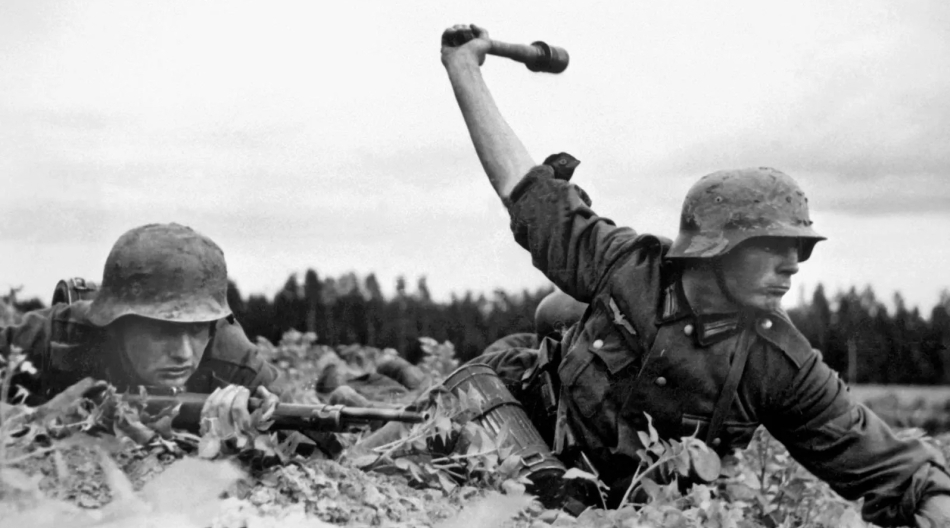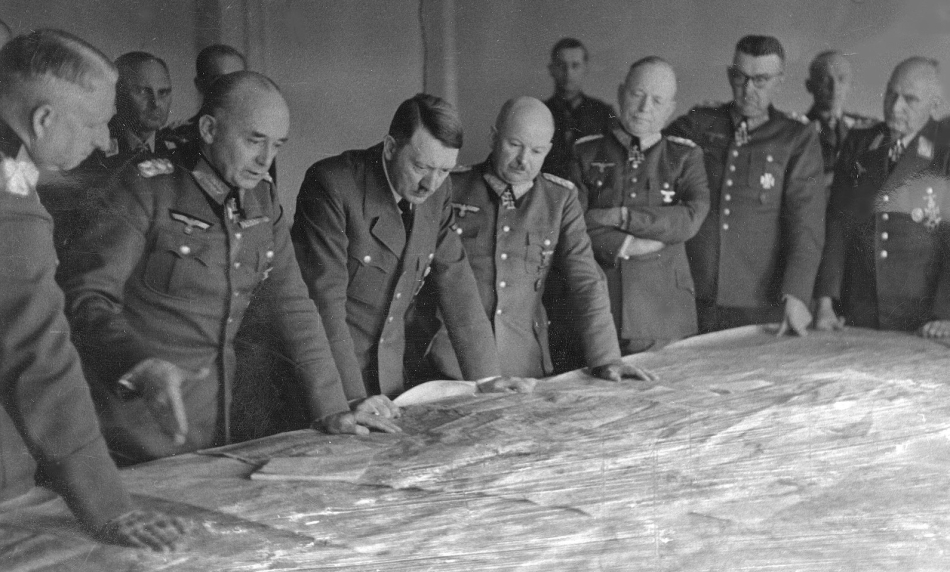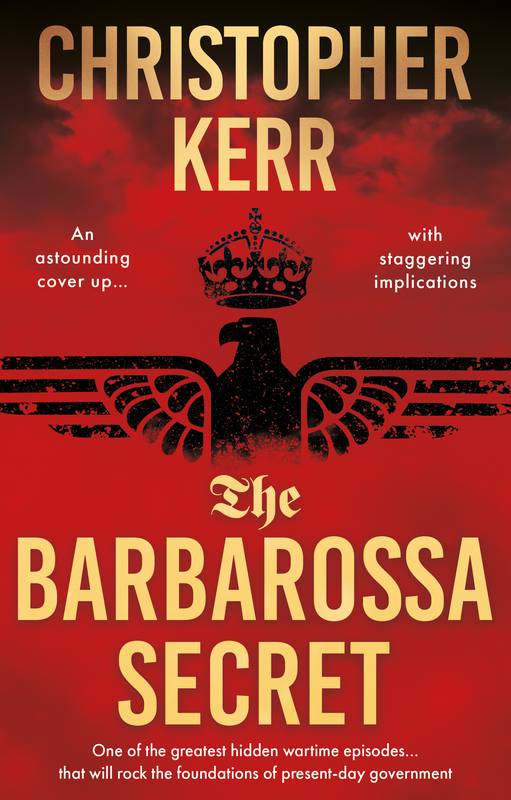Do not underestimate the power of historical fiction. It has its detractors but they are dwarfed by those who consume its appeal to entertain us. It’s fair to say historical fiction is often one of the best ways to learn about history. It allows us to have an emotional connection to characters and the things that have happened. If anything, it often sends us on a search to discover more about the real lives and events depicted within the pages of historical fiction.
I’m reminded of a wonderful quote by historical novelist Hilary Mantel, who once said, “History, and science too, help put our small lives in context. But if we want to meet the dead looking alive, we turn to art.”
That art she talks about is found in the pages of historical fiction where fact and fiction are blurred to tell us a compelling and often exciting story. That said, I can’t help but inform you the reader of a wonderful new historical fiction novel on its way called The Barbarossa Secret by Christopher Kerr. In short, it is a fascinating human drama in which a shocking cover-up involves many of the most infamous historical figures of WW2 and stretches to the present day.
For the record I am a big fan of historical fiction. British historian and novelist Adrian Goldworthy is someone who I admire greatly. When I was asked to consider reading The Barbarossa Secret, I was taken aback by its daring scope. Its author Christopher Kerr, a former entrepreneur, I soon discovered was relatively new to the genre but incredibly writes as though he has does so all his life. In a small village in the North of Wales Kerr’s professional dreams to become a novelist were truly first realised. After an initial friendly push he embarked on a journey which saw him dedicate an immense amount of time to researching and writing. From it came Kerr’s first historical fiction novel The Covenant. Next came arguably his most exhaustive project The Barbarossa Secret, which is the subject of this interview. But maybe more importantly, I wanted to discover a little bit about the author behind this incredible new novel.
Without further ado, I recently caught up with Christopher Kerr. Here is some of what we talked about.
Christopher, please tell us a little bit about how you came about fulfilling a lifetime ambition of becoming a novelist?
My career background is varied from an initial start in the Civil Service to an entrepreneurial path and I established a number of business ventures. I moved around a lot in my formative years, as my Father pursued his career in medicine, I found security in the escapism of reading. This freed my imagination to roam where I would become involved in the stories I read, playing a part as a brave chivalrous knight on the battlefield jousting, duelling over Flanders in a biplane, or pursuing adventure on the South Seas aboard a sailing ship. At boarding school, I developed a fierce spirit of independence, or, perhaps, rebelliousness but gained much from inspirational teaching of English and History, which, combined with my love of literature, gave me the foundation to write.
Initially, I wrote for personal/family purposes and would make up stories to tell my children which my wife often tried to persuade me to write. However, my business life constrained time to give to this although I wrote business articles and created marketing material for others as part of my business.
In recent years, I moved to North Wales which is an area I fell in love with having sailed here on my boat some twenty five years ago. I now live in a small idyllic village returning to my rural roots which I had embraced as a young child.
I finally came to a realisation that I needed to seize the moment as I reflected on my life and realised the price I had paid for the pursuit of success. In evaluating the balance between pragmatism and idealism I reached an epiphany; questioning whether I had sacrificed what I once believed in on the altar of capitalism. That gave me the inspiration to create a story where a covenant made in love was tested by life. The final spur lay in a dare set by a friend. She was speaking to me about unfulfilled ambitions, and said she would test my resolve, “Ok, Mr potential author,” she said, laying the challenge, “I dare you to write the start of a novel before morning that would set the scene for the entire book.” When I spoke to her, after emailing what I had written the following morning, she simply said, “That is a beautiful foundation; you have to write it!” What I wrote that night survived to become the prologue to my debut novel, ‘The Covenant’ – All done for a dare!
What are you generally looking for before contemplating even writing a novel? A good story? Or do you think there’s a large degree of ‘I-know-it-when-I-see-it’?
That is tough because I am driven by inspiration which seems to flow fuelling my creative instincts. There are mysteries in history which fascinate or intrigue or motives of greed, power, ambition, passion, or, even love, which may shape historical perspective. There are hidden elements of political and historical events which are often covered up or related in a narrative that suits our cultural outlook. Inspiration or, as Milton put it, the “heavenly muse” dictates the journey and the joy of writing may be reaching a destination I had not planned at the beginning but which is a haven of realisation.
What is the hardest thing about writing?
Finding the time and being disciplined to plan the spaces in life in which I can dedicate myself to my work. I love the experience and lose myself in the plot, becoming excited, emotional, involved and even upset at the unfolding events. I also become involved with characters and they become a very real part of my life so saying goodbye to them at the end or, if they pass away in the narrative, can be very tough.

Your debut as a novelist came about with your epic story of love, conflict and corruption in The Covenant. I understand it was well received particularly because of your most carefully made plans of interweaving a fictional story within historical settings. Why does historical fiction interest you so much?
This was a human drama set against a backdrop of fifty years of political and historical turmoil from the 1960’s, (although parts of the narrative go further back) to the present. Two people part whose careers are dazzling, mixing with the most powerful people in the world, in the process of which their idealism becomes corrupted leaving haunting questions from a covenant they make, as lovers, in 1969. This gave me a window through which to examine events which are fascinating to re-visit in the light of the world as it is to-day. By placing real events as a backdrop, it enables the story to have greater depth and authenticity, and allows an element of social commentary or revelation.
Do you have any literary ‘heroes’ and how have they shaped the way you write as a novelist?
I have many from Captain W.E. Johns, John le Carré, Jeffrey Archer, Barbara Erskine, Robert Harris, Edwina Currie, Frederick Forsyth, Nigel West to Shakespeare, Keats, or Christopher Marlowe and, of course, the extraordinary imagination of Enid Blyton that inspired me as a child. I think the adventures in the Enid Blyton books widened my imagination enormously, from my earliest days, until I moved on to CS Lewis or JR Tolkien. I admire the work of Frederick Forsyth whose research is inspirational in creating a real backdrop to his narrative.
I hope you don’t mind me bringing this up – you dedicated your new historical novel ‘The Barbarossa Secret’ to your late wife, Sheila. I can only imagine she would be extremely proud of you and how it has taken shape. I imagine she was probably your toughest critic too. Can you share a wonderful behind-the-scenes story?
Sheila encouraged me in everything, giving me a degree of self-confidence, which despite my entrepreneurial and political background wherein I did much public speaking, I was lacking beneath. She would never accept less than she believed I was capable of and constantly tried to get me to write. She had an expression from a children’s TV Show which she would say whenever I was facing an impossible challenge, pulling a strange face that she said could make anything happen, then say, “You can do it Duffy Moon”, especially if I was facing up to a major challenge and, yes, she used it to say I could write a novel! I can’t say she was a tough critic unless I was accepting any kind of defeat in anything wherein she would round on me and tell me, as my Mother did, to “Get on with it!”

Before we get to your new novel, can you tell us about your fascination in twentieth century history, in particularly World War Two? Why does it still make for a great subject to write about?
I think my genetic background is suited to it coming from the Kerr clan with its deep roots in history and a family motto which probably suits my late coming to writing, “Late but in earnest” given by a King when we had sensibly entered a battle late enough to ensure we joined the winning side! My Great Grandfather was a cabinet minister and my Grandfather stood for Parliament and was a philanthropic business man. I have always loved history and the twentieth century because we can more easily relate to motives and see the real people involved through newsreel, contemporary reports, and interviews. Of course, tragically, the twentieth century saw two world wars which have had a massive effect on what has shaped our lives to-day. In World War Two, we saw one man’s will dominate or affect most of the world. In addition, the world witnessed the horrors unleashed if absolute power is exercised without any humanitarian limitations. We see this to-day being replayed in Ukraine and the world is not fully united in outright condemnation. History fascinates because it resonates and we must not hide history but learn from it.
While I do not wish to spoil the central story and its conclusion, what can you tell me about some of the little known secrets of WW2 that made their way into your novel?
There are so many that, to coin a phrase, you could not make it up. We could talk of a plot by Nazi Germany to de-stabilise our democracy by encouraging the strengthening of the constitutional power of our crown to stand up to or replace our government. We could speak of many leading society figures admiring Hitler up to, and even after, the war started. Then the rift, which no-one speaks of, between King George VI and Churchill. We might look at why Hitler ordered his advance to stop in 1940 against the British Army in France; why Rudolf Hess flew to Britain in May 1941 (We were sold a load of hogwash about him having lost his mind); the part that the former King Edward VIII played who, of course, visited Hitler in 1938 at the Berghof. We could move to meetings during the War between Admiral Canaris, the Head of German Intelligence and Stewart Menzies, Head of the SIS or MI6. Many incidents are examined such as the involvement of the Duke of Kent, the King’s brother, in Hess’s flight to Britain. Why was Hess held in Spandau Prison and never released? He had hardly performed crimes of humanity to justify the longest incarceration at that point. We are told he committed suicide by hanging (at the age of 93!) just when Russia wanted his release in 1987! Did Albert Speer die of natural causes in a London Hotel or was he murdered? Operation Barbarossa was the largest land invasion in history and many in Britain supported Hitler’s aim of removing the communist Soviet Union as an entity. There are so many secrets to explore which are delved into within this work and, although it is a larger than average, novel, it could have been twice the size with still so much to explore. The book raises many questions which have never been sufficiently answered or explained.

There are some fascinating characters in your book, many of them despicable. Which one historical person did you find absolutely fascinating and how did you go about researching and or creating their story?
The greatest challenge was writing about Adolf Hitler and, in effect, meeting him as I wrote. I researched everything from his favourite tea set, to where his desk was positioned, how he liked to wear his uniform etc. I wanted to paint a real person not just some kind of mad pariah as he is too often depicted. We may not like those in history, or the present, but understanding them is necessary for their motives to be evaluated or anticipated. The research was endless such as finding out his pet names for staff, or favourite places, where he stayed and how he spoke. This was also true of others in the book such as Sir Winston Churchill and, indeed, George VI. There are scenes at the house of Churchill, at Buckingham Palace, and Balmoral. Equally there are scenes at the Reich Chancellery, the Berghof, and many historical places.
How much artistic license would you say you used to create your story? Why is it important in telling a good story especially when sometimes dry facts can be dull?
Whilst this book raises many questions, it is, nevertheless, a work of fiction, despite involving many real players of the day. I have created a Biographical Index in the back in order that readers can find out more about those that appear. I have created events in order to give direction to the plot but the reality of the essence of the story is one which has foundations in what was taking place and which was later covered up. In this story there are no “dry facts” but staggering elements which add extraordinary richness to the narrative.
What advice can you offer someone who has no prior knowledge of the historical events you cover and what do you hope they might take away from reading your new historical fiction?
This is a novel which will suit anyone from the historian, to the avid reader of a political or historical thriller. Having no knowledge of the war is no draw back but I think the reader will relish the experience of a journey into the corridors of power at a fascinating period whether it be because they like the relationships, the excitement, the intrigue, or, simply, the elements of conspiracy theory; there is something for everyone. However, for the historian, dates and times are correct and there is much to dwell upon or lose oneself in conjecture.
Finally, can you indulge the reader on anything you are working on at the moment? (New book?)
My latest novel is called, ‘Fission’. This is a book which traces the story of the nuclear weapon from its origins in Nazi Germany to a number of modern day events. This is an incredible, if not explosive, story that had to be told, of a dangerous race to obtain the ultimate deterrent which uncovers a global conspiracy. Power, emotion, idealism, and politics all compete in a drama that probes the greatest human instinct… survival! As the narrative unfolds, it unlocks the answers to one the greatest ever modern day unsolved conspiracy stories.


0 comments on “The Barbarossa Secret: Interview with historical fiction novelist Christopher Kerr.”